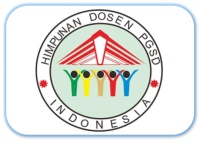Peningkatan Hasil Belajar Tematik Terpadu menggunakan Model Two Stay Two Stray di Kelas IV SD
Abstract
Integrated thematic learning emphasizes the activeness of students. While the conditions in the field indicate that students are classified as passive and low learning outcomes. The purpose of this study was to describe the improvement of integrated thematic learning outcomes using the Two Stay Two Stray model in class IV SDN 38 Piladang, Palembayan district. This type of research is a Classroom Action Research using qualitative and quantitative approaches. The research subjects were grade IV students with a total of 8 students at SDN 38 Piladang, Palembayan District. From the research results, it can be concluded that a) RPP shows the results of the increase in the RPP observation cycle I is 77.77%, in cycle II becomes 94.33%. b) the average value of the teacher's aspects in the first cycle was 80.05%, in the second cycle it was 92.00%. c) the average value of the aspects of students in the first cycle 80.35%, 96.42% in the second cycle. The learning outcomes of students in cycle I obtained an average value of 78.05% and increased in cycle II with an average value of 92.08%.
Keywords
Full Text:
PDFReferences
Depdiknas. 2004. Kurikulum Tingkat Satuan Pendidikan. Jakarta: Depdiknas.
Kemendikbud. 2014. Pembelajaran Terpadu
Prastowo, Andi . 2015. Rencana Pelaksanaan Pembelajaran (RPP) Tematik Terpadu. Jakarta : Prenadamedia Group
Purwanto, Ngalim. 2013. Prinsip-Prinsip dan Teknik Evaluasi Pengajaran. Bandung : Remaja Rosdakarya
Slavin, Robert E. 2015. Cooperative Learning: Teori, Riset dan Praktik. Bandung: Nusa Media.
Sugiyono. 2016. Metode Penelitian Kuantitatif, Kualitatif, dan R&D. Bandung: Alfabeta.
Susanto Ahmad. 2014. Teori Belajar dan Pembelajaran di Sekolah Dasar. Jakarta: Kencana Prenadamedia Group.
Suyanto., & Asep Jihad. 2013. Menjadi Guru Profesional: Strategi Meningkatkan Kualifikasi dan Kualitas Guru di Era Global. Jakarta: Erlangga.
Uno Hamzah, Dkk. 2014. Menjadi Peneliti PTK yang Profosional. Jakarta: Bumi Aksara
DOI: http://dx.doi.org/10.24036/e-jipsd.v10i3.10483


